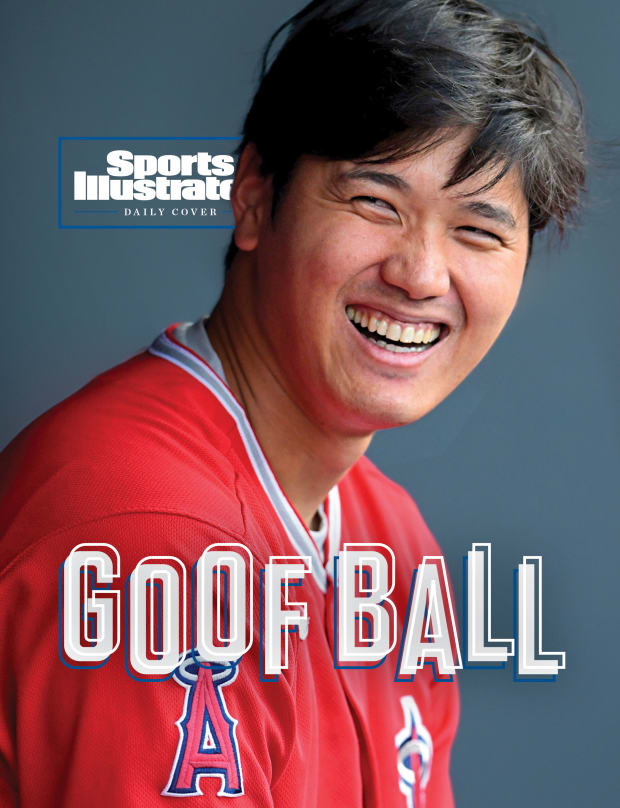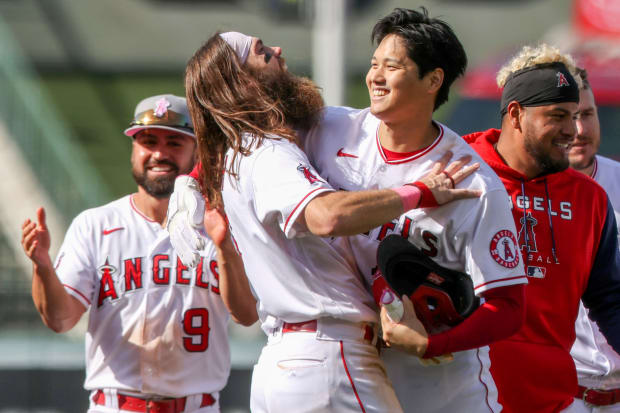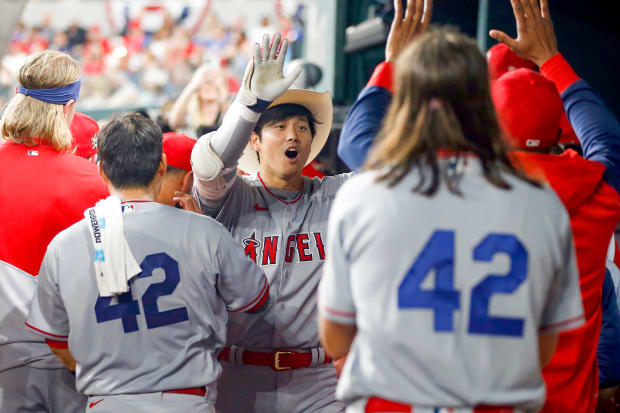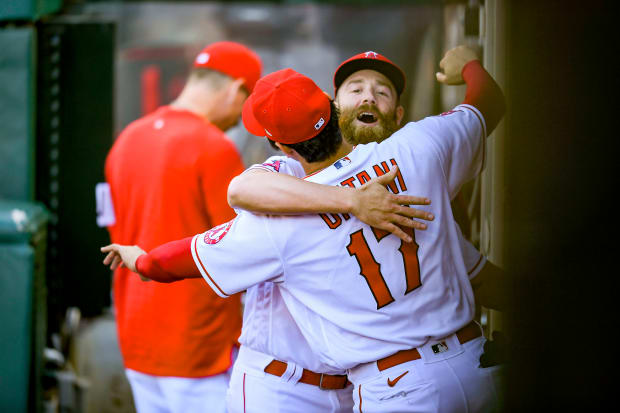Last week, as Angels assistant pitching coach Dom Chiti strolled by the visiting weight room at Fenway Park, he noticed the team’s two-way star and defending American League MVP doing one of the things he often does: working out. Shohei Ohtani grimaced as he tried to lift a silver rubber ball about a foot in diameter and throw it against the wall. Suddenly he turned. “Heads up!” Ohtani called, whipping the ball at his coach.
The lob almost knocked over the 63-year-old Chiti, who braced himself for what he expected to be a 20-pound projectile … only to realize the ball was filled with air. Ohtani, 27, dissolved into laughter.

Jayne Kamin-Oncea/USA TODAY Sports
“He got me bad,” says Chiti. There’s not much shame in that, though. Chiti was one of three victims that week of that prank, which Ohtani says is his favorite. As it turns out, Ohtani was doing another of the things he often does: goofing around.
“He’s always messing around,” says lefty Patrick Sandoval. “Very innocent-type stuff. It’s fun.”
Ohtani rarely speaks to the media—he declined through the team to be interviewed one-on-one for this story—so some elements of his personality have been slow to penetrate the public consciousness. But in recent weeks, cameras have caught him dramatically collapsing on first base coach Benji Gil’s chest; jokingly firing a ball at a fence behind which a White Sox fan was watching him; and, after going 3-for-24 to start the season, pretending to perform CPR on his bat in the dugout. Fans who pay close attention are beginning to learn what his teammates already know: Ohtani, who can throw the ball 100 mph and hit it 400 feet, is perhaps the most talented player in the history of the sport. He’s also pretty funny.
“He can come across as so focused, because he’s as disciplined as anybody I’ve ever met,” says GM Perry Minasian. “His work ethic and his routine are insane, [down to] the minute, but there are times where he can relax and joke around, and it’s pretty fun to watch.”
When Minasian took over before the 2021 season, he made two important changes to Ohtani’s routine. First, his usage: In Japan, where Ohtani was born and played until ’18, he pitched once a week and played the outfield three or four times a week, never the day before or after a start. He never got more than 382 plate appearances or made more than 24 starts in a season. The Angels tried to mirror that, tracking everything from how much sleep he got to how often he dove back to first base on pickoff attempts in an effort to protect him. After three good-but-not-outstanding seasons, Ohtani rebuilt his body. He adjusted his diet based on a series of blood tests. He went to Driveline, a private facility that has helped pitchers including Clayton Kershaw streamline their mechanics and add velocity. Ohtani finally felt healthy, he said. So last spring, Minasian and Maddon decided that Ohtani would dictate his own availability. As it turned out, that meant nearly every day.
The other change was to Ohtani’s training program. Because he was both a pitcher and a hitter, he was never fully either. In spring training, he would skip pitchers’ fielding practice to get to batting practice on time. He would play catch with his interpreter, Ippei Mizuhara, instead of with the other hurlers. All this bred discomfort and sometimes a touch of jealousy among his teammates. So Los Angeles adjusted scheduling so that he could participate fully in both areas.
As his teammates got to know him better, they were surprised by what they learned.
“At first I was very [taken aback],” says outfielder Brandon Marsh. “I was like, ‘Whoa, all right, Sho, you got a funny side.’”

Katharine Lotze/Getty Images
A convincing poker face helps sell some of his pranks. It also hides his personality from outsiders. “He’s a lot more outgoing than I thought he was gonna be,” says second baseman Tyler Wade, who joined the Angels from the Yankees last November.
Although Ohtani’s English has improved over the past five years, he still relies on Mizuhara for nuance. But the language barrier is much less imposing than it might seem, and besides, many gags require no interpretation: the weightless ball prank, for example, or his exaggerated reactions. (His surprised face, eyes wide, mouth agape, is a favorite.) He likes to sneak up behind teammates in the dugout, tap them on their far shoulder and act innocent when they turn around. He plays Clash Royale with teammates and gloats outrageously when he wins. (“I’m the king!” he will remind them for days.) And his laughter—often directed at himself—is childlike and infectious.
“He just giggles a lot,” says Maddon.
When Ohtani swears, he mostly does so in English, for his teammates’ benefit. He often pops up with a well-timed expletive, although no one wanted to be specific about which ones he uses. “Everyone learns the bad words first, right?” says third baseman Anthony Rendon.

Some of the jokes are made funny only by the joy Ohtani takes in them. After he throws a bullpen session, he waits until Sandoval is not paying attention, then flips the ball to him and laughs when he drops it. Ohtani also likes to stare at Sandoval until he notices, then repeat whatever he says. Before a game last week, Sandoval turned around at his locker to find Ohtani glaring at him.
“Are you serious?” Sandoval said.
“Are you serious?” Ohtani mimicked.
“You’re a bully!” Sandoval said. They both cackled.
When teammates are discussing an opposing pitcher, Ohtani sometimes offers an incorrect scouting report. “Good two-seamer,” he’ll say of a guy who throws only four-seamers, leaving his teammates to pause and rack their brains before they realize he’s kidding.

Tim Heitman/Getty Images
All of Ohtani’s American teammates have noticed how bright the spotlight is for him. Some two dozen Japanese reporters cover him as their full-time beat, and because he addresses the media only after he pitches, they often have to turn to his teammates for content. That first spring training, they sometimes answered questions about what Ohtani had eaten for breakfast that day.
“He deserves all the recognition that he gets, but it's a lot of attention, and I think he just enjoys being one of the boys in the clubhouse,” says reliever Mike Mayers.
Many Angels are famous in Japan because they keep showing up in photos of Ohtani; he recently informed Wade that the second baseman has many admirers abroad, and he now only addresses him as “ikemen,” which means “hot guy.” Ohtani hands out chocolate from the piles of fan mail he receives each day. “I like it a lot,” says reliever Archie Bradley, who lockers next to him in Anaheim. “He gives me a lot of candy.”
Ohtani goes out of his way to be a good teammate, the people around him say. Typically veteran hitters, for example, select a convenient hour to use the batting cage and rookies get out of the way. You might expect that to be doubly true for a veteran hitter who also has to find time to throw a bullpen session.
“He’s Shohei Ohtani, but when people come into the cage, he’s very cordial; he lets them go first,” says assistant hitting coach John Mallee. “He does a lot of things that I’ve seen veterans not really do—when it’s their time, it’s their time. He makes sure his teammates are taken care of before himself, and that is a really unique thing for a superstar.”
Ohtani understands how good he is, and after four years of sharing the field with Mike Trout, perhaps the best player who ever lived, and still never making the postseason, he understands how badly he needs his teammates to be good, too.
“I really like the team,” he told reporters in September through Mizuhara. “I love the fans. I love the atmosphere of the team. But more than that, I want to win. That’s the biggest thing for me. So, I’ll leave it at that.”

John McCoy/Getty Images
Minasian says he spoke to Ohtani afterward and said he wanted to win, too. And the Angels have made strides this year: At 21–12, they sit a half-game behind the Astros in the AL West and lead the sport in runs scored, with 164.
Ohtani is doing his best to boost that number. A few weeks ago, he hammered a line drive into the gap for a double. He came around to score and dramatically flung himself onto the bench.
“Ugh!” he moaned.
“What?” his teammates asked, worried.
Ohtani sighed, waited for a beat and said, with perfect comedic timing, “Homer pitch.”







